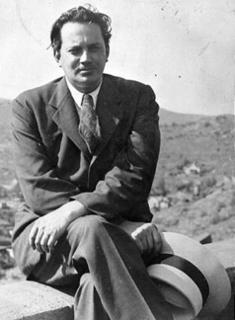Editors and Editees

I’m an editor and, during the past week, I’ve also been an “editee.” My book manuscript has come back to me, marked up with bright-colored changes, which I’ve been going over and, for the most part, accepting. It’s good for me to have this experience every now and then so I won’t forget that writers feel violated by my own ministrations.
Supposedly, the job of an editor is to help the writer say better whatever she wants to say. Occasionally that really happens. Take Thomas Wolfe, for example. (See his photo.) He’d write massive quantities of words and send them to Maxwell Perkins, who became famous for turning this lurid (and sometimes gorgeous) prose into novels. Without Perkins, Wolfe would have come to naught. Nowadays people don’t read him much anyway, and don’t admire his narcissistic excess, but at least the stuff is in print, which it wouldn’t have been without Perkins‘s pruning and cajoling. In their partnership they cooperated beautifully toward a common end.
The recipients of editorial suggestions may or may not appreciate the help they are given. And when they don’t, they may or may not express their resentment. Most of Peace Magazine’s contributors seem satisfied with what I have done to their articles when they appear in print, but others must prudently be refraining from complaining. As for my own editor, whose name I don’t even know, I accept at least 98 percent of her suggestions. It’s the remaining 2 percent that are giving me fits — all of which I fully deserve, as a haughty editor and gatekeeper myself.
That gatekeeping function is the real issue, for when certain topics arise the editor may not want to help you say what you mean, but rather to silence you. And the editor has the upper hand. If you don’t like her decisions, next time choose a different publisher or a different magazine. This week, far more often than in an average week, I’ve been on the wrong-side of gatekeepers, which is an infuriating, yet salutary, experience. It makes me realize how often everyday communication is censored by officious people who lack any idea what we really want to say. And how often they don’t really want to know. And, worse yet, how often we are ourself one of those officious persons.
Consider secretaries and receptionists, for exzmple. It’s their job to filter out cranks and frivolous callers. That’s a necessary function. Their bosses have to concentrate and focus. Having irrelevant information or questions coming in only distracts from productive work. Hooray for secretaries and assistants — but you’d better plan ahead before you call one of them. Categories are essential to their work. Each receptionist has a mental check-off sheet that you must fit. If your concerns fit neatly into one category, your call will probably be forwarded to, more or less, the right person. But if you have two or three different items of business, or if your one item does not fit the company’s departmental division of labor, you’ll disturb and irritate her, which is not the effect you want to achieve.
I’ve been on both ends of this situation too. When I can’t make out what the caller has in mind within fifteen seconds, I may become impatient. But when I’m the caller and can’t articulate my issue in thirty words or less, I take the receptionist’s impatience badly, and usually wind up feeling stupid.
People censor each other all the time. Sometimes we have an ideological interest at stake and simply don’t want to hear alternative opinions. Sometimes we just want clarity and concision. Life requires filtered communication, and we have to decide whether to be open and flexible, hearing whatever poorly shaped messages come along, or focused and purposive, trashing messages that don’t fit our preconceptions.
I believe that the worst failings of bureaucracies can be attributed to the latter tendency. It isn’t that officials have particularly selfish private interests, or that they want to control others and keep them from expressing themselves. It’s just that efficiency requires them to discard information that would take them off track. We’d never get anything done if we listened to everyone who comes along. And we get the wrong things done because we don’t listen enough.
Last year I read a newspaper article about a guy who teaches you how to get onto the Oprah show. He gives you a fortune cookie. You’re to write on the back of your fortune whatever message you want to broadcast. What a great discipline! Unfortunately, there’s a lot of meaning that won’t fit on such a small paper. And with all the spam that’s going around, we can’t stop to listen. So we edit each other, not to help others say what they want to convey, but just to manage our own time, and that of our readers and co-workers.
There’s no point in complaining about this. It’s part of the human condition in 2005 CE. Probably it has always been this way to some degree. The danger is increasing, though, that we’ll filter out some vital information because it isn’t what we were looking for. And, Lord knows, we’re filtered out ourselves all too often, for the worthy purpose of efficiency.



0 Comments:
Post a Comment
<< Home